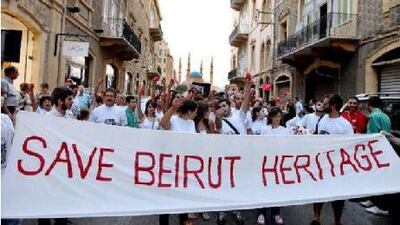The Lebanese have a funny relationship with property. Like being your own boss or saving money, owning land and/or your own home is key to ticking all of life's boxes. Understandably, then, selling property is fraught. For a start, many Lebanese vendors simply won't admit they want to - an attitude that, as you can imagine, makes finding a buyer that much harder. That paradox aside, it's all to do with completing the deal without letting on that you are in any way strapped for cash, a situation that might make potential buyers feel they have a negotiating edge.
Vendors also want to avoid wagging tongues. Ownership is so integral to the Lebanese idea of being a fully functioning human, only the desperate or foolish would part with it. This hasn't stopped people taking eccentric steps to stop it happening once they have gone. A wine producer told me his great-grandfather had given instructions that he be buried in the middle of the vineyard so that his sons would think twice about selling the plot. He knew they wouldn't want people saying "Look at so and so. He sold his father."
A little extreme, you might think, but then only last year my sister called our cousin when she heard he might be selling land. "Selling? Not at all! In fact I'm buying," he said, adding that if she knew of anyone in the area who had land for sale, he'd be interested. So, with all the cultural baggage that property and the sense of ownership entails, it's ironic that in the past 15 years, according to officials quoted in a recent news item by Agence France-Presse, "of the 1,200 old mansions and buildings inventoried in 1995 by the culture ministry, a mere 400 are left".
If this shocking statistic is true - and I have no reason to doubt it given that almost every splendid Beirut villa I knew of has vanished - it shows that, despite the received wisdom, the Lebanese will sell their grandmother if the price is right. It also highlights the ongoing destruction of the capital's urban heritage by developers allowed to run amok in a sector in which the government and local authorities have at best been negligent, and at worst shamelessly venal.
A campaign by the Association for Protecting Natural Sites and Old Buildings in Lebanon to stop the razing of old Beirut is being championed by Yvonne, Lady Cochrane, 88, the doyenne of Beirut society and a thorn in the side of the capital's developers since 1994, when Solidere, the development and reconstruction company, was mandated to rebuild the bullet-scarred and bombed-damaged Beirut Central District (BCD).
I'm sure Lady Cochrane, who was born into the super-wealthy Lebanese Sursock family, has some valid arguments in her battle with Solidere but I still maintain that, roughly speaking, expropriating the land in the BCD in return for shares was the best way out of what would have been a legal, not to mention emotional, quagmire. Without that, and the buccaneering energy of the late Rafik Hariri who backed the project, we wouldn't have the gleaming, albeit sterile, town centre we have now.
In any case, the original buildings where the BCD is had been already reduced to rubble rather than torn down to maximise developers' bottom lines. The moral boundaries that shape Lady Cochrane's latest crusade are more clearly defined. Ironically, the tree-lined neighbourhood that is named after her father's family has fallen victim to some of the most cynical developments, the most outrageous being the tower block that was built in the back garden of the Sursock Palace, apparently with the blessing of the current owners and the authority of the local municipality.
But in fairness, such developments are everywhere. Near my apartment, at the top of Rue Monot, where once there stood an elegant two-storey villa, is a plot of levelled land awaiting the machinery that will dig yet another of the gaping foundation holes that now define Beirut's streets. For most of the demonstratorswho marched through the streets last Sunday to protest against the demolition of old houses in the archaeological area of Al Gemmaizeh, the hoardings hide what they see as nothing less than a crime scene.
The big advertising boards surrounding the development tempt prospective buyers with the idea of living the "Urban Dream". To illustrate this Utopia, we have larger-than-life photos of a yummy mummy exercising while hubby talks earnestly on his mobile. Young children cavort with a puppy and an elder sister heads off to university. It is, in its way, a snapshot of the Beirut the developers want us to embrace.
But the urban reality is that once again another layer of a Lebanese history has been torn down and replaced by concrete towers, most of which are nothing more than a testament to unbridled commercial greed rather than thoughtful urban development. Salim Wardy, the minister of culture, is honest and decent and he has vowed to ensure that the rot will stop - but one man can only do so much. In any case, the damage has been done and ironically it is the architecture of Solidere, which was so opposed by Lady Cochrane, that now offers the only feeling of old Beirut.
In one of his recent columns for The Independent, Robert Fisk promised his readers, much like Basil Fawlty, that his next offering wouldn't mention the war. I will endeavour to do the same and not rant on about the property boom, its insanity, its shame and its greed. I wonder who will crack first.
Michael Karam is a Beirut-based communications and publishing consultant

